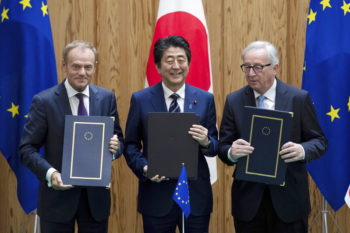
Japan and the European Union on Tuesday signed a wide-ranging free trade deal that both sides hope will act as a counterweight to the protectionist forces unleashed by U.S. President, Donald Trump.
The ambitious trade pact, which creates the world’s largest open economic area, comes amid fears that a trade war between the United States and China will diminish the role of free trade in the global economic order.
“There are rising concerns about protectionism, but I want Japan and the EU to lead the world by bearing the flag of free trade,” Prime Minister, Shinzo Abe, said at a news conference after the signing ceremony.
The United States this month imposed 25 percent tariffs on $34 billion of Chinese goods to lower the U.S. trade deficit, and China quickly retaliated with an increase in tariffs on U.S. goods.
The Japan-EU trade deal is also a sign of shifting global ties as Trump distances the United States from long-time allies like the EU, NATO and Canada.
“We are sending a clear message that we stand against protectionism. The EU and Japan remain open for cooperation,” European Council President, Donald Tusk, who speaks for the 28 EU national leaders, told reporters.
The deal removes EU tariffs of 10 percent on Japanese cars and 3 percent on most car parts. It would also scrap Japanese duties of some 30 percent or more on EU cheese and 15 percent on wines, and secure access to large public tenders in Japan.
Europe’s food sector is one of the biggest winners from the deal, which should allow it to capitalize on Japanese demand for high-quality cheese, chocolates, meats and pasta.
Japanese car and car parts makers are also expected to increase their sales to Europe, where they have lagged behind European rivals.
However, Japan’s dairy industry is expected to lose market share to European products once tariffs of up to 40 percent on some cheese imports start falling.
Japan and the EU also agreed on Tuesday to establish a regular dialogue on trade and economic policy, with the first meeting to be held before year’s end.
The dialogue will be chaired by Japan’s trade and foreign ministers and the European Commission’s vice-president for competitiveness, both sides said in a joint statement.
Japan and the EU account for about a third of global GDP and their trade relationship has room to grow, according to EU officials, who expect the deal to boost the EU economy by 0.8 percent and Japan’s by 0.3 percent over the long term.
Agency Report